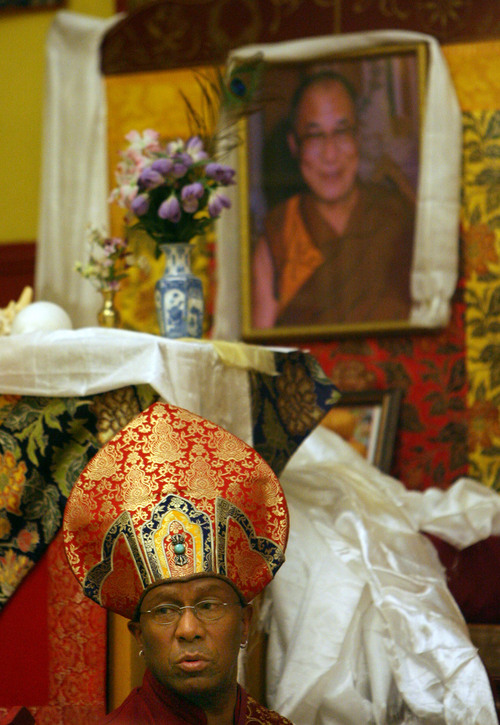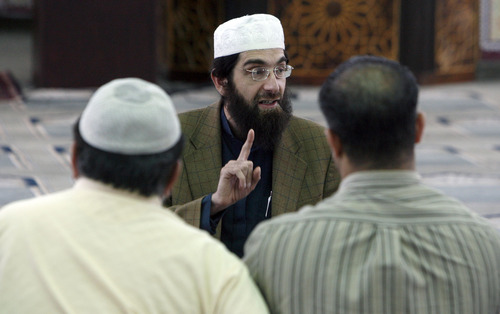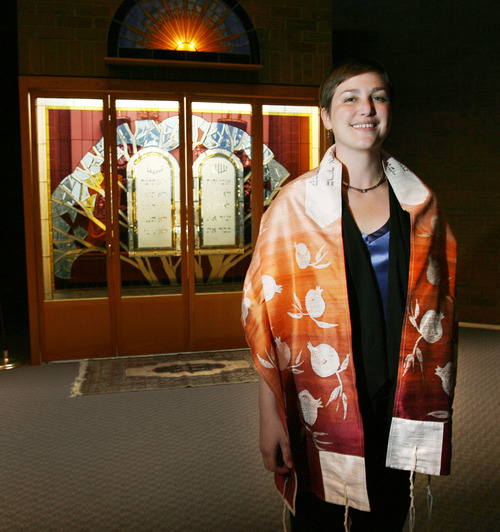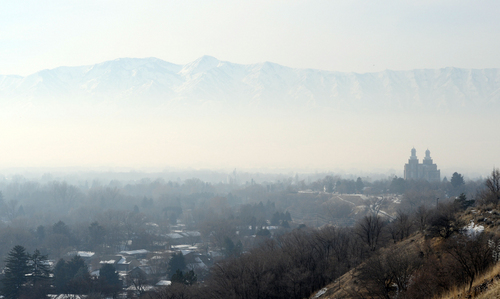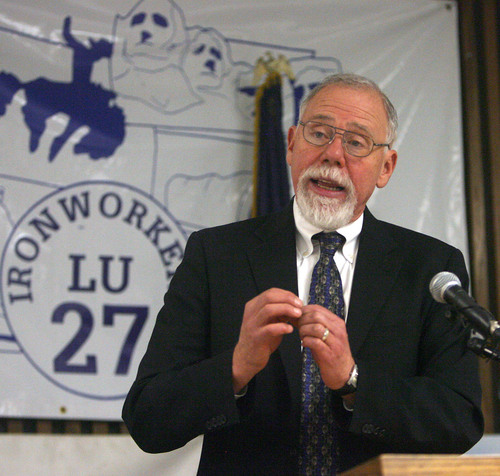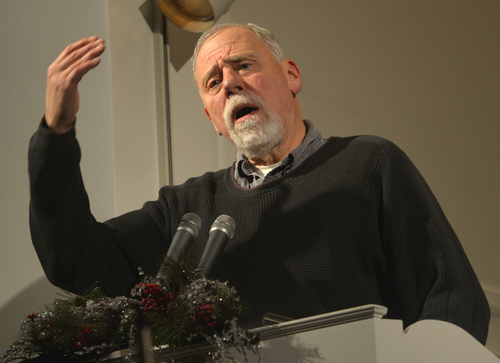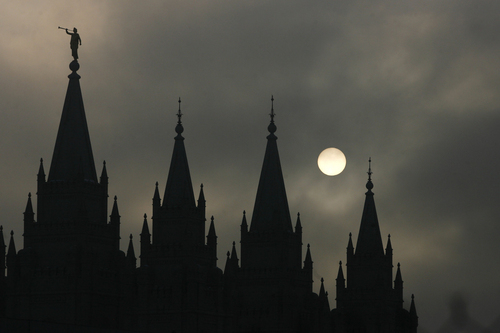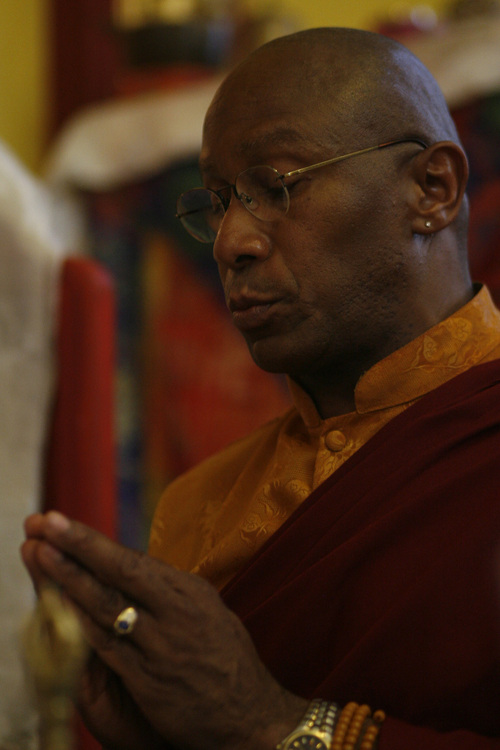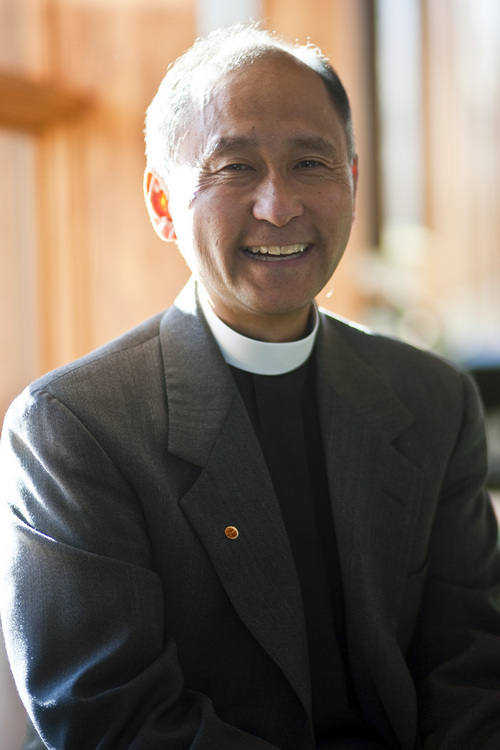This is an archived article that was published on sltrib.com in 2014, and information in the article may be outdated. It is provided only for personal research purposes and may not be reprinted.
The state's murky, polluted air — exacerbated by wintertime inversions — has affected the health and well-being of nearly all Utahns, and they're worried.
In a recent survey commissioned by The Salt Lake Tribune, Utahns favored stricter pollution standards on industry by nearly a 3-to-1 margin, and majorities across the board reported being more concerned about the state's air quality than they were five years ago.
Air quality is troubling for many, but is it a moral issue?
The Salt Lake Tribune asked a handful of Utah faith leaders if they were worried about it. Have they discussed it with their congregations? Do they have any spiritual or practical advice on the issue? And, as the Utah Legislature huddles on Capitol Hill, do these leaders back any particular legislation?
Here are their answers:
Bishop John C. Wester, Catholic Diocese of Salt Lake City
Air quality is a moral issue; it is a life issue. Studies show that unborn children in the womb are at grave risk from the effects of air pollutants. Children also face serious consequences from the effects of pollution on their growth and development. Our car emissions, industrial emissions and continued reliance on fossil fuels affect our current health, the health of our environment, the health of future generations and the health of nations far from us. As stewards of our environment, we are all responsible for the quality of our air and its negative effects. I encourage all Utahns, including legislators, to care for creation and do all in their power to protect human life.
Cody Craynor, spokesman for The Church of Jesus Christ of Latter-day Saints
While LDS Church leaders have not spoken specifically to issues of air quality in Utah, the church teaches that all humankind are stewards over the Earth and should gratefully use what God has given, avoid wasting life and resources and use the bounty of the Earth to care for the poor and the needy.
Imam Muhammed Mehtar, Khadeeja Islamic Center, West Valley City
Islam teaches that we are the stewards of the Earth. As a result of that, we have further responsibilities, among them the type of lifestyle we lead. Because of poor choices, we can do a lot of harm to our environment. The Quran states that we must not waste. If we have an alternative to using our car for getting to work, by all means we should do that. By not doing that, we are harming the environment and ourselves.
This has been the Islamic stance; that does not mean Muslim countries are perfect.
People in authority — whether state or religious leaders — have to always assist the people in being mindful of making choices that will enhance their own lives and the lives of others. If people are not taking heed to the matter of pollution, then it is the duty of legislators to step up and start making their constituents not only aware but presenting appropriate penalties for the benefit of the majority. That is the duty of legislators — commanding the good and preventing harm. It is also the duty of legislators to deal with the largest offenders first, as if they are causing the bulk of the damage, then having little people undertake small measures would be unfair as well as ineffective. I say this because our legislators typically find it easier to regulate the little people before those of more stature, and then if we see results that are ineffective, it leads us to conclude that there was never a problem in the first place. This is wrong and unhelpful, and Islam teaches us that all measures should be just, equitable and beneficial to society.
Bishop Scott Hayashi, Episcopal Diocese of Utah
In Genesis, we are instructed to be the stewards of the Earth and all that God has given us. We fail in that task when we ignore common sense and common science to curb our pollutants, consider our global warming and examine our inability to give up such personal "freedoms" such as driving whatever car we want to wherever we want when we want.
I feel all people of faith must not only listen to God, but to scientists and advocates who offer counsel to protect his Earth. For many reasons of social justice, stewardship and sharing, I hope all people of faith will carefully follow the Legislature and become advocates mindful of our Lord's desires. I am encouraged to see proposals such as House Bill 61, which allows for new grants and loans for retrofitting or using machines and vehicles that are more air quality friendly.
We are truly blessed to live in a place where we see mountains, lakes and trees. In the past, God's gift wasn't enough. We wanted new industry at any cost. We wanted to cover up fields with concrete. We wanted progress. I am reminded of Jeremiah 2:7, "I brought you into a plentiful land to eat its fruits and its good things. But when you entered, you defiled my land and made my heritage an abomination. "
Rabbi Ilana Schwartzman, Congregation Kol Ami, Salt Lake City
My synagogue is hugely frustrated with the air. I have congregants who are talking about moving to Park City or Emigration Canyon to escape the air. A number of congregants were at the recent protest, while still others were unable to attend because of the air. I have one little girl who wanted to go with her parents, but she's been sick for weeks and couldn't imagine standing outside in the air that makes her sick.
For Jews, the way we take care of the world is certainly a moral issue. We believe that we are stewards of the Earth — God has given us the responsibility to take care of creation. Beyond that, we believe that the saving of a human life takes precedence over all other mitzvot (commandments) and this is certainly life-threatening. It is unconscionable that each of us is breathing air that is life-threatening.
I have acknowledged the issue from the pulpit, but have not yet given a full sermon about it. On Martin Luther King Jr. weekend, our Kol Ami had our annual Mitzvah Day where we invite congregants to do beneficial things for the larger community. One of our opportunities was to write to our legislators about issues important to us. Many people wrote about the air. We love Salt Lake City, we love the Earth. We cannot continue to live this way.
The congregation does not have a stance on legislative remedies. I personally believe that by focusing too largely on wood-burning stoves, our government is misguiding us away from the harmful effects of fuel emissions, byproducts of industry and the responsibilities that each of us has. If the mandate of our government is to keep us safe, they are failing us.
I would love Utah to stop fighting the Environmental Protection Agency on issues of political power and focus on the needs of our community and the Earth. God is not going to fix this without our participation. We cannot wait for storm systems to push out the bad air. We have to stop producing bad air.
Lama Thupten Dorje Gyaltsen (Jerry Gardner), Salt Lake's Tibetan Buddhist Temple
I have lived in a lot of places and I have seen the quality of air change. It is obvious that we live in conditions where the air is unacceptable. The air we presently are breathing is the responsibility of everyone. I take responsibility for the air that I am breathing; it is affecting me. I am also patient and know that all things will change. We also have some geological conditions in Utah that contribute to this condition. There is no quick fix. For it to change, it will take constructive and concerted efforts in dialogue and compromise without entanglement. If we don't change our own behaviors, then how can we expect change to occur within our environmental reality?
But some things may be affecting us even more deeply than air quality. I think there's a correlation between physical and metaphysical aspects of our humanness. Perhaps the disturbances of our own inner winds are being reflected outwardly. We can see it in health care, marriage, child-abuse concerns, etc. As we begin to look inward and purify our own minds, winds and energies, we can formulate solutions outwardly that will benefit all of us.
The Rev. Bill Young, pastor at The Rock Church, Salt Lake City
I do not/cannot speak for everyone in my church on this topic. In fact, other than just sidebar conversations, I have not even heard serious complaints, conversation or concerns shared with me from those people who attend The Rock Church. So this is mostly just my personal perspective.
Is it a moral issue? Not really. I personally see it more as a social/economic issue. I think air-quality concerns need to be addressed from the standpoint of, "Hey, is there anything we as a community can do to help lessen the negative effects of the inversion?" and go from there. I am also conscious of the fact that we have had fairly serious drought conditions in the [Salt Lake] Valley for the past several years and this contributes greatly to the intensity of the inversion. I'm thinking that if we were blessed with a few years of ample precipitation, we wouldn't even be talking about this nearly as much — but I'm no meteorologist. … I wouldn't want to do anything at this point to bring more restrictions or penalize businesses in our state that might adversely affect the job market and economy.
The Rev. Tom Goldsmith, pastor at the First Unitarian Church, Salt Lake City
The failure by our state government to respond appropriately to the toxic air in the Salt Lake Valley remains a bit of an enigma. When did clean air, one of the prerequisites to health, become a partisan issue? I always figured that conservatives and progressive alike inhaled the same air into their lungs and shared a deep concern for their families and generations to come. What am I not understanding? What is our state government failing to comprehend?
Government is myopic economically if it believes it is upholding business interests by regulating industries as little as possible. Tourism suffers as well as future development. Who wants to expose their families to life-threatening toxins? Morally, the state government fails to act in good faith on behalf of its citizens. We pay too high a price to accommodate fossil-fuel industries in their irresponsible endeavors to increase their bottom line.
As a member of the clergy representing a faith community in this valley, I implore our state government to honor the social contract by which we must live: No life is expendable in efforts to increase profits. We turn to our government officials to remedy the suffering endured by a callous preference of business over human life.
Going green
More and more Utah churches are putting their faith — and funding — into "greener" chapels, temples and sanctuaries.
For example, the state's predominant religion, the LDS Church, has trumpeted a new line of energy-efficient meetinghouses, complete with solar panels, xeriscaped landscaping and parking for electric cars. In November, the First Unitarian Church celebrated the installation of 124 solar panels at its east Salt Lake City building.
In fact, 2103 emerged as a "banner year for solar projects on houses of worship," Susan Soleil, executive director of Utah Interfaith Power & Light, said this week in a news release touting Rocky Mountain Power's latest round of renewable-energy funding.
"Since 2006, more than 100 community-based renewable-energy projects in Utah have been awarded funding made possible by support from our Blue Sky customers," Alene Bentley, Rocky Mountain Power customer and community manager, said in the release. "This includes projects at 14 houses of worship."
The latest Blue Sky awards will boost solar projects at the following sacred spaces:
Congregation Kol Ami, Salt Lake City
Holladay United Church of Christ, Holladay
St. James Episcopal Church, Midvale
St. Thomas More Catholic Church, Sandy
South Valley Unitarian Universalist Society, Cottonwood Heights
St. Matthew's Lutheran Church, Taylorsville
St. Stephen's Episcopal Church, West Valley City
Shepherd of the Mountains Lutheran Church, Park City
St. Luke's Episcopal Church, Park City
Temple Har Shalom, Park City


